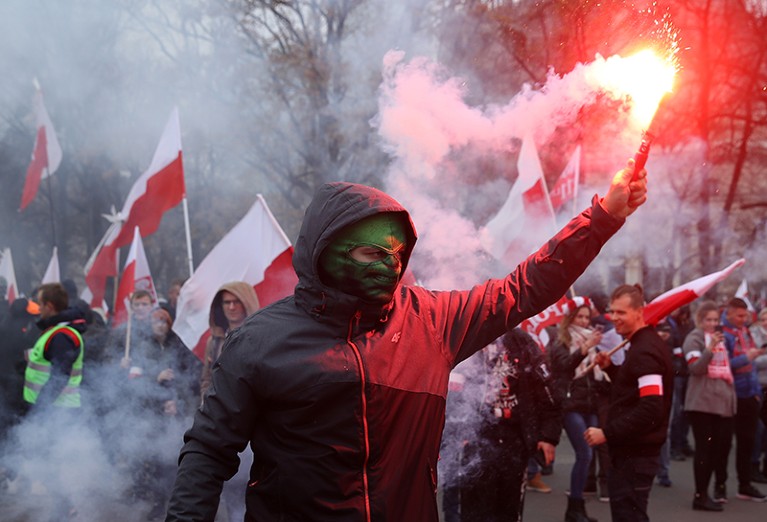
The rise of the far right in Poland highlights the increasing threat to academic freedom in Europe.Credit: Sean Gallup/Getty
Hidden inside a 1970s office block close to London’s Waterloo station is a tiny organization that has helped tens of thousands of academics find sanctuary from conflict. Co-founded 85 years ago by the economist William Beveridge and physicist Ernest Rutherford, the organization, now called the Council for At-Risk Academics (CARA), enabled many notable twentieth-century scientists — including biochemist Hans Krebs and philosopher Karl Popper — escape the Nazis and settle at British universities. In recent years it has reached out to the Middle East and receives the largest volume of applications from Yemen and Iraq.
A 100th birthday wish: uphold academic freedom in dark times
CARA and its counterparts in other countries exist because governments in the host nations value three of the pillars on which democracy rests: the rule of law, a free press and, as we explore in a Comment article, freedom of academic enquiry. If the British government were to decide not to support even one of these, CARA would struggle to carry on.
Such an alarming scenario is not purely hypothetical. For at least the past two decades, citizens of countries in the European Union have increasingly been voting for parties of the extreme right (also known as the populist right or radical right). From almost no representation in the 1990s, these parties are in governing coalitions in 10 out of the EU’s 28 member states, including in Austria, Hungary, Italy and Poland. Next May sees elections to the European Parliament in which right-wing parties are expected to increase their combined tally of 78 seats in the 751 seat chamber.
When parties of either the extreme right or extreme left take power, any one of democracy’s foundational pillars can be knocked away.
Journalists and their families are intimidated. Judges are demonized and replaced with allies. People from minority groups are singled out for their alleged disloyalty. And action is taken against academics: universities are brought under direct state control and staff are subjected to loyalty tests.
It’s a classic playbook to quash dissent. Take Poland for example, where the state has moved to exert control over the media and judiciary. Academic freedom is under threat too. A barometer for the risk it could face will be how much protest the Polish government allows, if any, over its pro-coal stance — which climate scientists have warned against — during the annual United Nations climate talks to be held in Poland next month.
Although there has been much media attention on the phenomenon of the populist right, the implications for academic freedom have gone largely unreported. Even where there has been widespread coverage — such as the case of Hungary’s Central European University which was forced to enrol new students in Vienna rather than Budapest — EU institutions such as the European Council and the European Parliament have been largely powerless to take action.
Europe’s heads of government are biting their lips, and their reasons for doing so are understandable, even if European agreements or conventions are being violated. There is, of course, the principle of non-interference in the affairs of a sovereign state. But, in addition, the EU works through the collective solidarity of its member states. This is what has enabled the organization to enact progressive policies in climate change, anti-discrimination legislation and employee rights.
But collective progressivism breaks down when one-third of EU governments include political parties with scant commitment to protecting democratic institutions. Now that EU governments include parties who do not believe in the rights of people from minority groups, the consensus on climate change, or, indeed, academic freedom, it will become more difficult for the EU as a whole to either advance, advocate or protect policies in these fields.
“What’s wrong with the world is not nationalism itself,” noted Michael Ignatieff, the embattled rector of the Central European University. What’s wrong, he added, “is the kind of nation, the kind of home that nationalists want to create and the means they use to seek their ends.”
Ignatieff wrote these words more than 20 years ago in Blood and Belonging (BBC Books, 1993), at the end of a series of journeys into some of Europe’s conflict zones. But he remains optimistic about the continent’s future. “I don’t want to predict doom and gloom,” he told Nature. “Regimes come and go, but universities remain.”
Academics everywhere will hope he’s right. They, and us, can help by speaking out against injustice and specific cases where academic freedom is threatened — by any regime.

 A 100th birthday wish: uphold academic freedom in dark times
A 100th birthday wish: uphold academic freedom in dark times
 The best research is produced when researchers and communities work together
The best research is produced when researchers and communities work together
 Science under siege: behind the scenes at Trump’s troubled environment agency
Science under siege: behind the scenes at Trump’s troubled environment agency


